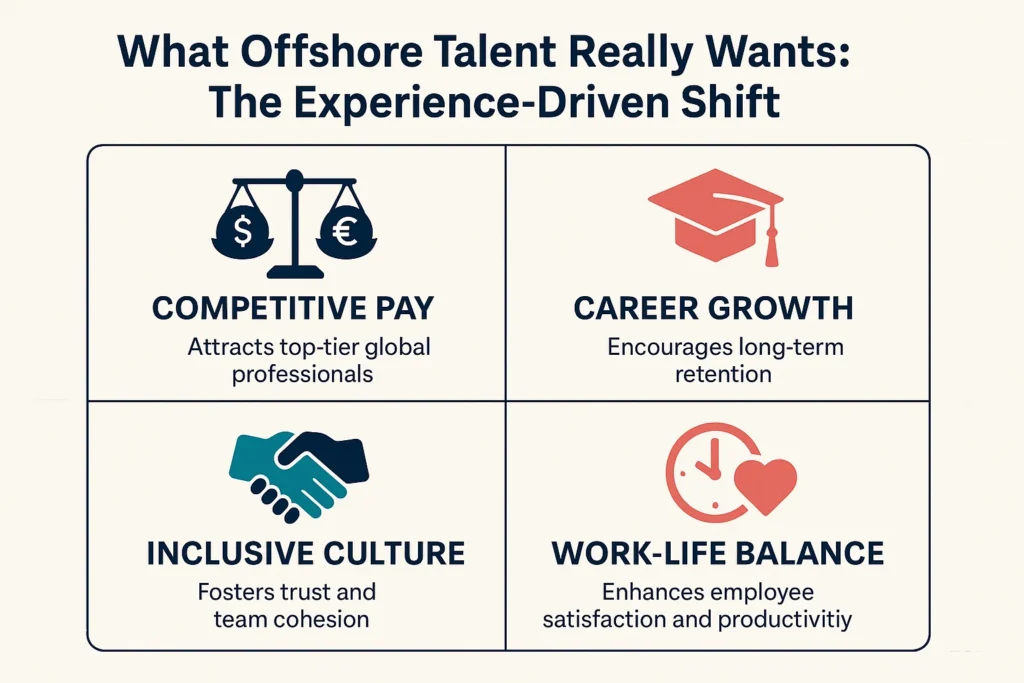Startups can thrive by embracing agile hiring models, remote scalability, and a global-first mindset.
The competition for global talent acquisition has never been more intense. Startups and multinational corporations (MNCs) are both striving to hire top professionals worldwide. While enterprises leverage scale and established systems, startups counter with agility and innovation. According to LinkedIn’s Global Talent Trends (2024), flexibility and remote work are among the top priorities for today’s workforce, making the global hiring landscape more dynamic than ever (LinkedIn, 2024).
Local hiring often limits access to specialized expertise, which is why offshore hiring for startups is becoming essential. By expanding their reach globally, startups can build agile workforce solutions and attract niche talent at cost-effective rates.
Example: A Kolkata-based SaaS startup reduced hiring costs by 40% and onboarded a complete development team within three weeks using offshore hiring strategies.
This approach supports remote team scalability, enabling smaller firms to compete against well-funded enterprises.
Enterprises dominate MNC talent sourcing due to their financial strength, employer branding, and structured growth paths. In contrast, startups attract talent through speed, flexible work options, and equity benefits. Research shows that 58% of professionals prioritize flexible work arrangements over higher salaries (LinkedIn, 2024), which gives startups a competitive edge.
Startups may not match enterprise budgets, but they can still compete by:

Lean offshore teams allow startups to access tech talent offshore from regions like India, Eastern Europe, and Southeast Asia. This strategy ensures cost efficiency without compromising quality.
Case Study: A fintech startup scaled from three engineers to fifteen in under 60 days through distributed recruitment, ensuring productivity across time zones.
Hiring niche professionals like AI engineers or cybersecurity experts is challenging locally. Startups leveraging distributed recruitment gain access to these skill sets by targeting regions known for tech innovation, aligning with the future of offshore hiring (Deloitte, 2023).
Freelance Platforms – Ideal for short-term or project-based work.

Seamless virtual onboarding is key for productivity and retention. Companies with structured onboarding programs improve employee retention by 82% in the first year (Deloitte, 2023). Using tools like Slack, Zoom, and Asana ensures smooth integration across borders.

The future of offshore hiring isn’t just cost-driven; it’s experience-driven. Employees expect:
Startups addressing these expectations can outperform enterprises in retention and engagement.
In the global talent race, startups have unique advantages: speed, flexibility, and innovation. By embracing remote team scalability, agile workforce solutions, and distributed recruitment, they can compete with even the largest corporations. The message is clear: Think beyond borders to build your dream team.
Join thousands of businesses leveraging offshore staffing to scale their operations globally
Expand effortlessly with My Offshore Employees - access top 1% offshore talent starting at just $3/hr or $600/month per FTE. No hidden fees, no compromises on quality. Your offshore employees work exclusively for you - ensuring focus, transparency, and real-time visibility into your projects. We combine smart automation and proven industry experience to deliver higher productivity, fewer errors, and tailor-made solutions for your business growth.

© 2022-Present MyOffshoreEmployees.com – A brand of iWebGenics Pvt. Ltd. (India)